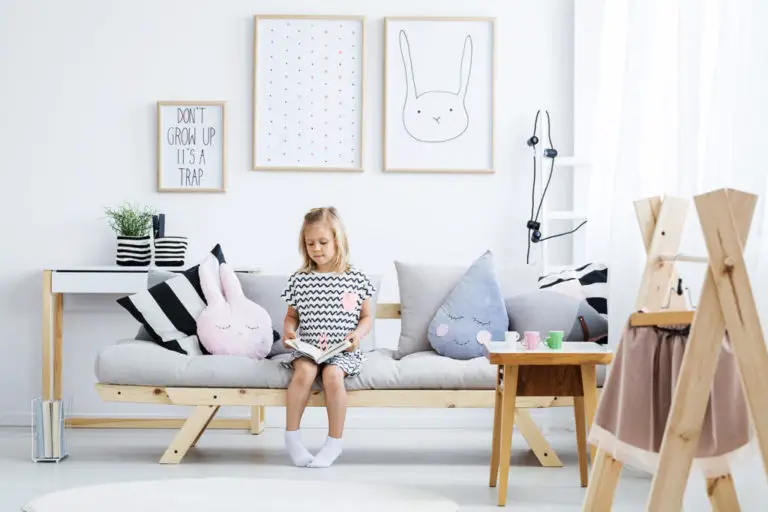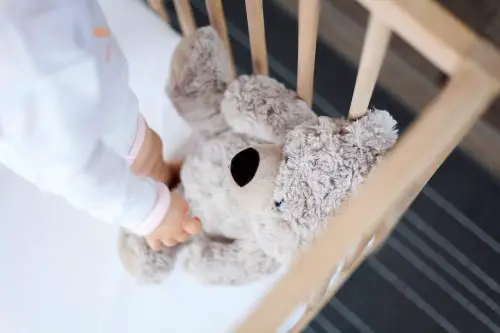Your baby’s not sleeping? 7 Tips to Help Them
Babies need much more sleep than adults. Nevertheless, the need for sleep of babies deviates individually by a few hours. The rhythm of sleep and wakefulness in small infants has to be adjusted first. Your baby doesn’t sleep, is always restless and screams a lot? Then there are ways to make it easier for him to fall asleep.

Babies’ need to sleep
Your baby needs a lot of sleep. Sleep is vital for the brain to process the fullness of new impressions and stimuli. The REM phase, the sleep time for processing and ordering impressions in the brain, is longer than in adults. Newborns up to three months sleep about 17 hours on average. Thereafter, the need for sleep is reduced to an average of 14 hours up to a sleep duration of approx. 13.5 hours with 18 months. These sleep times are not a fixed size. They may vary by approximately two to three hours within the first three months. Often parents overestimate the child’s need for sleep. Babies do not have a long night’s rest and do not have very long day waking times. In the first three months, a sleep-wake rhythm must first become established. That varies from baby to baby. So don’t compare your child with your girlfriend’s, that maybe he is a sleeper, but watch your baby. If the baby makes a basically satisfied impression, does not scream constantly and sleeps approximately the average time distributed over the course of the day and night, there is no cause for concern. If there are severe problems falling asleep and sleeping through, it is time to investigate the causes.

What the baby needs for a healthy sleep
Your baby spent nine months protected in her mother’s body. The birth is almost a moon landing for the little one. Physical closeness is important for babies to feel secure when they discover the world. You should treat the baby to this closeness during the night hours as well. An extra bed is at first a suitable place to sleep at night. The baby’s nest during the day can be a cradle or a bassinet. Such sleeping places give you security to have your baby always with you and create for the baby a shelter in parental proximity. In the beginning there is still no recorded sleep and awake rhythm. The little ones simply fall asleep when body and brain demand it. Even if many babies can sleep deeply regardless of their immediate environment and various disturbances, environmental stimuli influence the quality of sleep. Disturbing environmental irritants include loud noises, brightness, cold, heat, intense odours and bad air. A baby-friendly sleeping mat is very important. The baby should also be dressed appropriately for the environment, i.e. neither too warm nor too thin clothing. Not to be underestimated is the mood of mother, father or other constant caregivers. We are not masters of every mood, but stress, impatience, anger, the constant gaze to the clock while breastfeeding, influence the inner peace or restlessness of your baby. This often has an effect on poorer sleep.
Inspiration for your dwarf room
When the baby doesn’t sleep – you can do this
No healthy baby “doesn’t sleep.” But children can sleep too little, constantly too briefly or for a long time not come to rest. Then these tips can help your baby and you:
- Let your baby fall asleep at the breast or in the sling and only put him into the bed when he is sleeping deeply. The small body is then completely relaxed, the hands flaccid, breathing regular.
- Create at the sleeping place twilight light and tranquility. There should be no TV or loud music in the vicinity. The sky can be pulled around the cot to protect it from draughts and light changes.
- Sing a quiet lullaby to the baby, preferably always the same song extra for sleeping. Also the small music box above the cradle is proven.
- Cradle the baby to sleep. There are weighing beds with automatic weighing function. In the beginning, weighing on the arm or body is the most beautiful thing for the baby.
- Develop sleep rituals for the evening to which your baby reacts well: Delete light, blinds, small night lights, good-night music, cuddly toy. Gentle abdominal or back massage, depending on whether the baby is asleep in the supine or lateral position. Hold hands. Some babies fall asleep better in the evening if they are bathed beforehand.
- Do not close the bedroom door until the baby has fallen asleep and the baby monitor is switched on.
- Don’t turn on a bright light when breastfeeding at night, it’ll keep your baby and yourself sleeping well.

The duration a child needs for an adapted sleep-wake rhythm varies. Be patient with your baby and also with you. If you create a good, healthy sleeping environment for your baby, offer him a healthy baby cot and a lot of physical closeness and love, you have done nothing wrong. Nevertheless, your baby may be one of the writing babies. In this case it needs even more support at the start of life and infinite patience.
Challenge for parents – the writing baby
According to various studies, 9 % to 29 % of our writing babies belong to the group of writing babies. The baby writer speaks when a child cries for three hours on at least three days a week for three weeks. This can have different causes. Check with your pediatrician to see if the baby is physically healthy. If this is the case, it can be comforting that the screaming phase is over with the third, at the latest fourth month. Until then, patience of angels is required. Please be sure to check if your baby may be affected by too many stimuli. Over-stimulation by constantly changing voices, noises, much restlessness and more intensifies the sleep problems of the baby. The Schreibaby wants to get some rest, but she can’t. The be-all and end-all with these children is a lot of physical contact. You can learn calming methods such as suitable baby massages and more from the midwife or at special writing baby consultation hours. Pucken has proven its worth. The baby is wrapped in a special cloth. Writing babies cannot also use self-calming with the help of thumbs, fists or pacifiers. The puck cloth prevents the abrupt arm movements with which many writing babies are deprived of sleep and creates a narrow, soft protective space that conveys an increased sense of security. All other of the seven tips above should still be followed. Sleeping aids such as weighing, singing, carrying around in a sling, and proximity at night should be used even more intensively. Calming breast-feeding (putting on without eating) is helpful. Parents of writing babies should seek help. It’s nice when a patient grandma, aunt or girlfriend can temporarily take over the baby. Recovery breaks are important so that the baby’s screams and the exhaustion of mother and father do not become a cycle in which the baby reacts with even more screaming to the parents’ stress mood.
Conclusion: the first year of life is unique – sleep problems can be solved
The first year of life is a unique, enormously important stage of life for both child and parents. Therefore, you should not overestimate any irregularities in the sleeping characteristics of your baby. If it sometimes sleeps a day too little or sleeps a day almost forever, that is not a problem. If a baby is loved and the environmental conditions are right as far as possible, then a healthy baby also takes the sleep it needs. For the very young, these are often not the times their parents want. But this is only a small part of your child’s exciting, irretrievable, great first year. It is normal for you to get too little sleep and for the baby to be more restless and fall asleep less well. The problems can be solved when you find out which of the sleep aids work best for your baby. Even with a writing baby there are enough calmer moments of the day to enjoy happiness with the baby.




